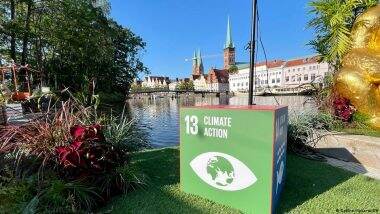The next few weeks bring the start of the summer holidays, complete with traffic jams and crowded airports. The German tourism industry is responding to climate concerns.According to a survey by the World Wide Fund for Nature (WWF), 80% of Germans say they are aware of human responsibility for climate change. Despite this, most do not want to give up holiday trips.
In 2022, travel had returned to the level seen before the COVID-19 pandemic, the umbrella organization for the German tourism industry reported, estimating that 2023 could be a new record year.
According to WWF, tourism contributes to global warming with about 5% of greenhouse gas emissions. Three-quarters of these emissions come from transport.
The CEO of the German National Tourist Board, Petra Hedorfer, acknowledges the problem, however, the consequence cannot be to give up travel. "No mobility is surely the worst solution," she told DW. Travel has a social aspect, promoting open-mindedness and tolerance.
Tourism also is an important economic contributor and employer in many countries. "In Germany alone, we have three million people directly employed in the industry," said Hedorfer, adding that it was also a matter of freedom: "To not travel anymore would also mean depriving people of their fundamental right to shape their individual freedom according to the UN Charter."
Using less jet fuel
The industry is relying mainly on technological solutions. The latest generation of airplanes uses up to 30% less fuel. German carrier Lufthansa wants to have 195 of these new planes in operation by 2030. The company has high hopes for sustainable aviation fuels, which can be made without fossil fuels, according to Lufthansa's Director of Sales for Germany, Alexander Tolweth.
Airline passengers can already buy tickets with which they help finance these fuels, which can be mixed with conventional fuels at a ratio of up to 20%. But the amounts produced so far are not nearly enough.
"Carbon offsetting can help bridge the gap," Petra Hedorfer said. "Currently, far too few people offset their journeys. I think it would be good to highlight that more clearly and promote it, as well as make it easier to do."
Drive electric or plant trees
It is not only air travel that is being increasingly focused on when it comes to the carbon footprint of a journey.
The city of Lübeck, northeast of Hamburg, was awarded the certification of "sustainable travel destination" in 2023.
With its picturesque medieval city center, which is a UNESCO World Heritage Site, Lübeck welcomes up to 2.4 million guests each year, bringing in up to €840 million ($915 million) in revenue. This makes tourism one of the most important economic factors for the city, which is also famous worldwide for its marzipan, a sweet treat made from ground almonds, sugar and rose water.
Christian Martin Lukas, head of Lübeck-Travemünde marketing, is proud that his city has been named a sustainable travel destination. Public transport is recommended to travel there — the €49 monthly ticket, with which people can travel throughout Germany on local trains, buses and trams, is "a huge opportunity," Lukas said. Those choosing to drive can plant trees to compensate for the carbon dioxide emissions from their journey. Increasing numbers of electric buses are on the streets of Lübeck and the boats, which circle the island of the old city in the river Trave, also have electric motors.
The entire travel industry wants to become more sustainable — and not only for ecological reasons. When hoteliers use less bed linen, hand towels, water and electricity, their operating costs are significantly reduced. Sustainability is increasingly a factor in advertising. "A clear brand positioning of Germany as a travel destination for sustainable, quality tourism is the key to a successful future amid international competition," Hedorfer said.
Lübeck: A 'sustainable travel destination'
But what exactly can this sustainability look like? Much needs to change in Germany, according to Uwe Hiksch from the environmental activist association Naturfreunde Deutschland (Nature Friends Germany]. "A holiday should not mean that the Alps are turned into Disneyland, and it should not be allowed to happen that the luxury resorts are expanded. I think for example about the right to water, if golf courses are built in the middle of arid regions, if swimming pools are built in water-scarce areas," Hiksch told the federal Bundestag parliament's tourism committee.
Those striving to be sustainable of course also want to convey that to their guests and customers in a believable way. Worldwide, there are about 800 different certificates and labels which are awarded to sustainable tourism initiatives. It is difficult for customers to figure out what they all really mean.
The path to sustainability, according to Martin Lukas from tourism marketing in Lübeck, is one "made up of many very small parts." It requires contributions from everyone, including tourists themselves. "As a guest you can say, yes, I will choose a destination that takes sustainability seriously. It is about taking responsibility and I believe that we are doing that."
This article was originally written in German.
While you're here: Every Tuesday, DW editors round up what is happening in German politics and society. You can sign up here for the weekly email newsletter Berlin Briefing.
(The above story first appeared on LatestLY on Jun 27, 2023 06:10 PM IST. For more news and updates on politics, world, sports, entertainment and lifestyle, log on to our website latestly.com).













 Quickly
Quickly




















